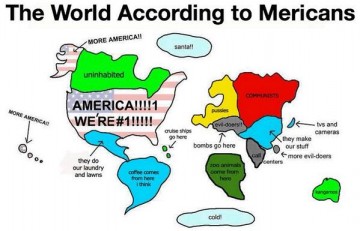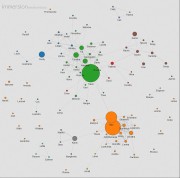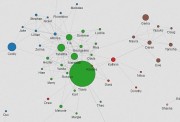23.01.2014 – Das Privacy and Civil Liberties Oversight Board (PCLOB) hat den NSA-Überwachungsprogrammen in einem 238-seitigen Bericht, der der Washington Post und der New York Times vorliegt, ein vernichtendes Urteil ausgestellt, die Sammlung von Vorratsdaten als illegal bezeichnet und den Stopp dieser Programme gefordert.
Weitere Unterabschnitte: NSA-Skandal | Nachrichtendienste | Nachrichtendienste 2 | Nachrichtendienste 3 | Überwachung 1 | Überwachung 2
Crypto Wars 2.0
Google… a key element in the fight against #NSA spying
I suspect that Google will soon be a key element in the fight against #NSA spying.
— Jacob Appelbaum (@ioerror) 1. November 2013
Jan 17th 2014 – We’ve mentioned things in the past like former NSA and CIA director Michael Hayden "jokingly" talking about how he’d like to put Ed Snowden on a "kill list" while simultaneously suggesting that the NSA should be a part of determining who to target. While some would dismiss this as a tasteless "joke" it seems like he’s not the only one in the intelligence community with such thoughts. We just recently noted that reporter Steven Levy, who spent over two hours interviewing NSA officials, had said that they appear to have a real and passionate hatred towards Snowden.
Ron Paul: "We should not be surprised that these reforms do nothing to protect us from the surveillance state."
After all, if it were not for the public reaction to Edward
Snowden’s revelations… http://t.co/JqgKZkw1gW pic.twitter.com/uXCKJ0SUk3
— Ron Paul (@RonPaul) 18. Januar 2014
16.01.2014 – Die NSA hat heimlich Software auf Computern installiert, um sie auszuspionieren, auch, wenn sie offline sind. Computer-Experte Martin Holland erklärt der DW, wie das möglich ist – und was die NSA dadurch erreichen will.
The World According to Americans

January 14, 2014 – “I am proud and honored to welcome Edward Snowden to Freedom of the Press Foundation’s board of directors. He is the quintessential American whistleblower, and a personal hero of mine,” said FPF’s co-founder Daniel Ellsberg. “Leaks are the lifeblood of the republic and, for the first time, the American public has been given the chance to debate democratically the NSA’s mass surveillance programs. Accountability journalism can’t be done without the courageous acts exemplified by Snowden, and we need more like him.”
13. Januar 2014 – "Die Amerikaner haben uns belogen"
Das geplante No-Spy-Abkommen der Bundesrepublik mit den USA droht zu scheitern. Bundesregierung und BND erwarten nicht mehr, dass die Vereinigten Staaten auf die Überwachung von Deutschen verzichten werden. Die Verbitterung ist groß.
13. Januar 2014 – "Keinen erkennbaren Einfluss": Ein politisches Forschungsinstitut in den USA stellt der massenhaften Telefondatensammlung durch den Geheimdienst NSA ein vernichtendes Zeugnis aus. Ermittlungen würden meist durch andere Methoden angestoßen.
January 13, 2014 – Secret NSA eavesdropping is still in the news. Details about once secret programs continue to leak. The Director of National Intelligence has recently declassified additional information, and the President’s Review Group has just released its report and recommendations.
With all this going on, it’s easy to become inured to the breadth and depth of the NSA’s activities. But through the disclosures, we’ve learned an enormous amount about the agency’s capabilities, how it is failing to protect us, and what we need to do to regain security in the Information Age.
January 11, 2014 – In January 2013, while facing several years behind bars, celebrated Internet activist Aaron Swartz made the final decision to take his own life. He was only 26 years old. One year later, the Internet honors his memory by continuing his fight against censorship, defense of the public domain, and online surveillance.
07.01.2014 – Dieser Beitrag von Glyn Moody ist zuerst in dem Buch “Überwachtes Netz” erschienen
January 8, 2014 – These two pieces, the first by Marcy Wheeler, in part commenting on the second by Amy Davidson in the New Yorker (along with Snowden himself, in his interview with Bart Gellman) are the first I’ve seen making a point I’ve been making for years: contrary to the frequent assertions in the last week (including by Fred Kaplan) that Snowden is particularly reprehensible because he "broke his OATH of secrecy," neither Snowden nor anyone else broke such a secrecy "oath."
January 7, 2014 – Stealing J. Edgar Hoover’s Secrets: One night in 1971, files were stolen from an F.B.I. office near Philadelphia. They proved that the bureau was spying on thousands of Americans. The case was unsolved, until now.
unterzeichnet von William Binney, Thomas Drake, Edward Loomis, J. Kirk Wiebe, Ray McGovern, Elizabeth Murray, Coleen Rowley, Daniel Ellsberg
January 7, 2014 – In a memo to President Obama, former National Security Agency insiders explain how NSA leaders botched intelligence collection and analysis before 9/11, covered up the mistakes, and violated the constitutional rights of the American people, all while wasting billions of dollars and misleading the public.
Immersion: a people-centric view of your email life
- Immersion Demo – Was eMail-Metadaten verraten – Screencopy
- Immersion Demo – Was eMail-Metadaten verraten
January 2014 – The signatories of this declaration call upon nation states to take action. Intelligence agencies must be subjected to transparency and accountability. People must be free from blanket mass surveillance conducted by intelligence agencies from their own or foreign countries. States must effectively protect everyone’s fundamental rights and freedoms, and particularly everyone’s privacy.
The #NSA walks into a bar…
The #NSA walks into a bar. Bartender: "Got a new joke for you." NSA: "Heard it."
— Nein. (@NeinQuarterly) 12. Juni 2013
26 December 2013 – NSA whistleblower omitted from new exhibition on cyber security as museum says it does not want to be seen to back his actions.
MPs have accused Bletchley Park, the wartime predecessor of GCHQ, of trying to airbrush history after it said it would ignore the whistleblower Edward Snowden’s revelations about mass surveillance by the security services in its museum’s new gallery on cyber security.


